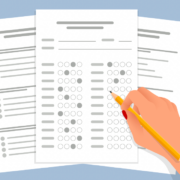Civil Procedure on the Multistate Essay Exam – Highly Tested Topics
Civil Procedure on the Multistate Essay Exam: What Do I Need to Know?
Are you taking the bar exam in a jurisdiction that administers the Uniform Bar Exam (UBE) or the Multistate Essay Exam (MEE)? If so, it’s important to know how Civil Procedure on the Multistate Essay Exam looks because it is the most highly tested subject! Civil Procedure has appeared on the UBE 11 times on the last 14 exams! Below we tell you the most frequently tested issues in Civil Procedure on the Multistate Essay Exam.
Civil Procedure on the Multistate Essay Exam: What Do I Need to Know?
1. Personal Jurisdiction
Personal jurisdiction refers to the court’s power to hear a case over a particular person. The Examiners want you to be familiar with how to analyze both general and specific jurisdiction. There are three bases for general jurisdiction – presence, consent, and domicile. If none of these are present, then go on to analyze specific jurisdiction (minimum contacts test). Lastly, make sure that if a court has personal jurisdiction over an individual that it also complies with the Due Process Clause.
Occasionally, the Examiners have tested whether putting a product in the stream of commerce is enough for personal jurisdiction to exist. Be familiar with the different approaches set forth in the US Supreme Court case Asahi Metal Industry v. Superior Court.
2. Subject Matter Jurisdiction
Subject matter jurisdiction is also one of the most common issues in Civil Procedure on the Multistate Essay Exam. Remember that subject matter jurisdiction refers to the power of the federal courts to hear a particular case. Subject matter jurisdiction can appear in several ways:
-
Federal Question Jurisdiction
- The easiest way for federal question jurisdiction to exist is if the plaintiff asserts a claim that is a federal question created by federal law (e.g., the United States Constitution, federal statutes). Look at the face of the plaintiff’s complaint! Also, remember that federal question jurisdiction does not exist if the plaintiff merely anticipates that the defendants will raise a defense based in federal law.
-
Diversity Jurisdiction
- To find that diversity jurisdiction is present you must find that there is complete diversity of citizenship between the plaintiffs and defendants and that the amount in controversy exceeds $75,000. Every now and then the Examiners well test some of the nuances of diversity jurisdiction, including: 1) an executor is from the same state as the decedent for diversity purposes; 2) whether diversity exists is determined at the time the lawsuit is filed; and 3) the “legal certainty” test is used to see if the amount in controversy has been satisfied.
-
Supplemental Jurisdiction
- Federal courts may exercise supplemental jurisdiction over additional claims that do not meet the elements of federal question or diversity jurisdiction. If you see a fact pattern where a party is trying to add a claim to case that is already in federal court, first check whether federal question or diversity jurisdiction exists! If neither is present, only then should you analyze supplemental jurisdiction. Be mindful of the restrictions placed on a plaintiff’s ability to add claims using supplemental jurisdiction.
3. Service of Process
Furthermore, be aware of the details concerning service of process pursuant to Rule 4 of the Federal Rules of Civil Procedure. There are four ways to serve an individual: 1) serve according to state law methods where the federal court is located or where service is made, 2) serve an agent of the individual, 3) serve the individual directly, or 4) leave a copy of the summons and complaint at the individual’s abode with someone of suitable age and discretion.
You should also be familiar with the different ways to serve a corporation. Again, you may comply with state law methods where the district court is located or where service is made. Or you can deliver a copy of the summons and complaint to an officer or managing agent of the corporation.
Lastly, remember if the defendant is challenging the validity of service of process, she must do so in her first response to the plaintiff or it may be waived.
4. Venue
Venue determines in which judicial district a Plaintiff may file a lawsuit. We already know that a federal court has the power to hear the case. But we must narrow down which federal court(s) can hear the case. Sometimes the Examiners have tested how to determine venue for an individual or a corporation.
The Examiners can also test venue in the context of conflict of laws. Specifically, the Examiners want you to know which law applies when venue is transferred to a more appropriate forum (the law of the transferor court). Or you will be tested on which law applies when a case is transferred to judicial district with a proper venue (the law of the of the transferee state).
As you are studying, also make sure that you memorize the rules for the aforementioned areas and understand how they have been tested on previous MEEs. Use this as a starting point and then go on to reviewing the rules for other topics, such as removal, res judicata, and collateral estoppel.
We hope this post on Civl Procedure on the Multistate Essay Exam is helpful!
Ambika, one of our bar exam tutors, wrote this post on Civil Procedure on the Multistate Essay Exam. She has passed three bar exams, including California, New York, and New Jersey. Ambika scored in the 95 percentile on the MBE, and specializes in helping students raise their uniform bar exam scores!
Seeking MEE Expertise?
🌟 Freebies & Discounts
- Free Bar Exam Resource Center: Explore for leading guides, articles, and webinars.
- Expert-Crafted Bar Exam Guides: Unveil insights on high-frequency MEE topics and strategies for success.
- Free Webinars: Engage with top bar exam experts.
🔥 Top-Rated MEE Resources
- MEE One-Sheets: Boost your confidence with our most popular bar exam product!
- Bar Exam Outlines: Our comprehensive and condensed bar exam outlines present key information in an organized, easy-to-digest layout.
- NEW MEE Mastery Class: Unearth focused, engaging reviews of essential MEE topics.
- Bar Exam Crash Course and Mini Outlines: Opt for a swift, comprehensive refresher.
- MEE Private Tutoring and feedback: Elevate your approach with tailored success strategies.
- MEE Course: Preview our acclaimed five-star program for unmatched instruction, outlines, and questions.
🔥 NEW! Dive deep into our Repeat Taker Bar Exam Course and discover our unrivaled Platinum Guarantee Pass Program.






